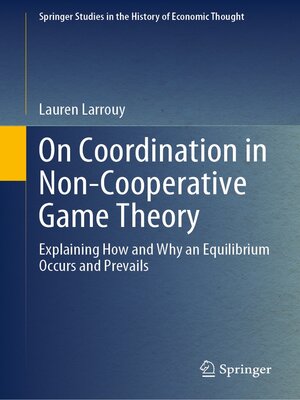On Coordination in Non-Cooperative Game Theory
ebook ∣ Explaining How and Why an Equilibrium Occurs and Prevails · Springer Studies in the History of Economic Thought
By Lauren Larrouy

Sign up to save your library
With an OverDrive account, you can save your favorite libraries for at-a-glance information about availability. Find out more about OverDrive accounts.
Find this title in Libby, the library reading app by OverDrive.



Search for a digital library with this title
Title found at these libraries:
| Library Name | Distance |
|---|---|
| Loading... |
By offering a critical assessment of the evolution of standard game theory, this book argues for a shift in the ontology and methodology of game theory for appraising games, one based on understanding the players' strategic reasoning process.
Analyzing the history of economic thought, the book highlights the methodological issues faced by standard game theory in its treatment of strategic reasoning and the consequence it has on the status of players' beliefs. It also highlights how the two original contributions of T. C. Schelling and M. Bacharach can be applied to these issues. Furthermore, the book assesses the intersubjective dimension in games by applying the cognitive sciences and by integrating simulation theory into game theory.
Consequently, this book offers an interdisciplinary approach for reassessing the nature of the intersubjectivity involved in strategic reasoning. It shows that the analysis of games should involve the study and identification of the reasoning process that leads the players to a specific outcome, i.e., to a specific solution. A game should not be understood (as is done in standard game theory) as a mathematical representation of an individual choice at equilibrium. This requires investigating the players' capacity for coordination. Understanding the process of coordination allows us to understand strategic reasoning and ultimately to provide new answers to the indeterminacy problem, one of the central hurdles in game theory, and one that underscores its normative difficulties.







